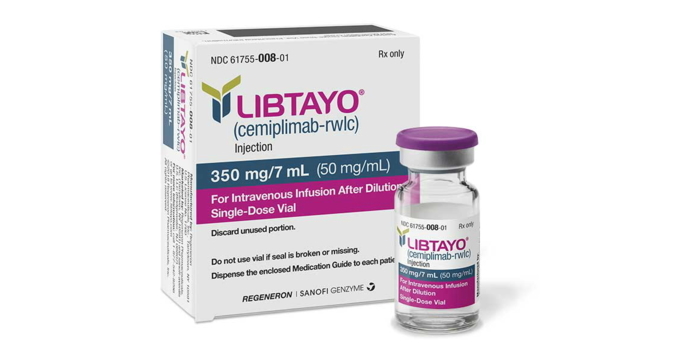Libtayo gets a double with EU approvals in skin, lung cancer

Sanofi and Regeneron's checkpoint inhibitor Libtayo has tripled its approved uses in Europe, after getting the nod for the treatment of advanced basal cell carcinoma (BCC) and advanced non-small cell lung cancer (NSCLC).
The approval of Libtayo (cemiplimab) in advanced NSCLC is for first-line treatment of patients with 50% or more PD-L1 expression and no EGFR, ALK or ROS1 aberrations, taking the drug into a large market dominated by Merck & Co/MSD's rival checkpoint inhibitor Keytruda (pembrolizumab).
BCC is new territory for cancer immunotherapies however, and Libtayo is the first drug in the PD-1/PD-L1 inhibitor class to get go-ahead in this common form of skin cancer. It's been cleared for second-line use in patients who have progressed or are intolerant to hedgehog inhibitor therapy.
Libtayo was the sixth PD-L/PD-L1 inhibitor to reach the market, starting out as a therapy for another skin cancer called cutaneous squamous cell carcinoma (CSCC), and the rarity of that disease has meant sales have remained relatively modest.
Sanofi booked €26 million ($31 million) from the drug in the first three months of the year, with Regeneron recording $69 million in sales, although the partners both think that Libtayo as the potential to reach blockbuster revenues.
BCC is a key element of that potential – some analysts think it could be a $1.4 billion indication on its own – and the EU green light comes after Sanofi and Regeneron claimed US approval for BCC in February.
The approval is based on a phase 2 trial showing that Libtayo achieved a response in 29% of patients with metastatic BCC and 32% among those with locally advanced disease, with 90% of patients having a duration of response of six months or more.
BCC accounts for up to 80% of non-melanoma skin cancers, and while many are caught early and easily cured with surgery or radiotherapy, a small proportion of cases develop into advanced disease that is much more difficult to treat.
Meanwhile, the new NSCLC use in Europe also follows an earlier approval by the FDA that gives Sanofi and Regeneron a niche position in a very large but highly-contested market.
The indication is based on a phase 3 trial – Empower-Lung 1 – that showed Libtayo given as a monotherapy cut the risk of death by 43% compared to chemotherapy in advanced, PD-L1-high patients without mutations that would make them candidates for other, targeted first-line drugs.
Libtayo joins the clutch of checkpoint inhibitors vying for a slice of the first-line NLSCLC market, nipping at the heels of Keytruda which made a big chunk of its $14 billion sales in 2020 from lung cancer.
Keytruda is used mainly in combination with chemo in first-line NSCLC, based on trial data showing a 51% reduction in death versus chemo alone – although it is also approved as a monotherapy and has the advantage that it can be given to patients regardless of their PD-L1 status.
That would suggest that Libtayo will struggle to make headway against its more established rival, although the picture may not be quite so simple.
On its own, Keytruda cut the risk of death by 38% and 31% in two trials comparing it to first-line chemo in PD-L1-high patients. Sanofi and Regeneron are hoping that their higher top-line mortality reduction could encourage prescribing in that population – particularly as they claim the design of Empower-Lung-1 could have favoured the chemo group and underestimated Libtayo's benefit.
They also say that around 12% of the patient population in their trial had brain metastases, while 44% had squamous cell cancers – both groups which tend to be harder to treat.
Other rivals are also trying to grab a slice of the first-line NSCLC market however, including Bristol-Myers Squibb's combination of PD-1 inhibitor Opdivo (nivolumab) and CTLA4 inhibitor Yervoy (ipilimumab) and Roche's Tecentriq (atezolizumab).
As a monotherapy, Libtayo could capture up to $1 billion in sales from the NSCLC category, according to analysts, although additional upside is possible if an ongoing combination study yields positive results. That study – Empower-Lung 3 – looking at Libtayo plus chemo with or without Yervoy and is due to read out later this year.











